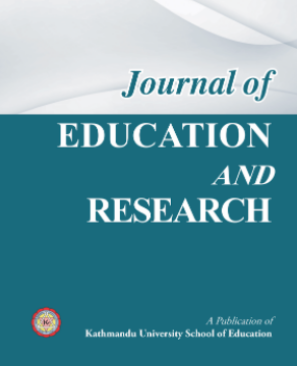
“Neoprivatisation” in Public Schools in Nepal
Original Article
Journal of Education and Research, Volume 9, Issue 1, 2019, 46-69, https://doi.org/10.3126/jer.v9i1.28824
Publication date: Mar 15, 2019
Views: 567 | Downloads: 1086
How to cite this article
APA
In-text citation: (Ghimire & Koirala, 2019)
Reference: Ghimire, S., & Koirala, K. P. (2019). “Neoprivatisation” in Public Schools in Nepal. Journal of Education and Research, 9(1), 46-69. https://doi.org/10.3126/jer.v9i1.28824
Reference: Ghimire, S., & Koirala, K. P. (2019). “Neoprivatisation” in Public Schools in Nepal. Journal of Education and Research, 9(1), 46-69. https://doi.org/10.3126/jer.v9i1.28824
Vancouver
In-text citation: (1), (2), (3), etc.
Reference: Ghimire S, Koirala KP. “Neoprivatisation” in Public Schools in Nepal. Journal of Education and Research. 2019;9(1):46-69. https://doi.org/10.3126/jer.v9i1.28824
Reference: Ghimire S, Koirala KP. “Neoprivatisation” in Public Schools in Nepal. Journal of Education and Research. 2019;9(1):46-69. https://doi.org/10.3126/jer.v9i1.28824
AMA
In-text citation: (1), (2), (3), etc.
Reference: Ghimire S, Koirala KP. “Neoprivatisation” in Public Schools in Nepal. Journal of Education and Research. 2019;9(1), 46-69. https://doi.org/10.3126/jer.v9i1.28824
Reference: Ghimire S, Koirala KP. “Neoprivatisation” in Public Schools in Nepal. Journal of Education and Research. 2019;9(1), 46-69. https://doi.org/10.3126/jer.v9i1.28824
Chicago
In-text citation: (Ghimire and Koirala, 2019)
Reference: Ghimire, Shurendra, and Kamal Prasad Koirala. "“Neoprivatisation” in Public Schools in Nepal". Journal of Education and Research 2019 9 no. 1 (2019): 46-69. https://doi.org/10.3126/jer.v9i1.28824
Reference: Ghimire, Shurendra, and Kamal Prasad Koirala. "“Neoprivatisation” in Public Schools in Nepal". Journal of Education and Research 2019 9 no. 1 (2019): 46-69. https://doi.org/10.3126/jer.v9i1.28824
Harvard
In-text citation: (Ghimire and Koirala, 2019)
Reference: Ghimire, S., and Koirala, K. P. (2019). “Neoprivatisation” in Public Schools in Nepal. Journal of Education and Research, 9(1), pp. 46-69. https://doi.org/10.3126/jer.v9i1.28824
Reference: Ghimire, S., and Koirala, K. P. (2019). “Neoprivatisation” in Public Schools in Nepal. Journal of Education and Research, 9(1), pp. 46-69. https://doi.org/10.3126/jer.v9i1.28824
MLA
In-text citation: (Ghimire and Koirala, 2019)
Reference: Ghimire, Shurendra et al. "“Neoprivatisation” in Public Schools in Nepal". Journal of Education and Research, vol. 9, no. 1, 2019, pp. 46-69. https://doi.org/10.3126/jer.v9i1.28824
Reference: Ghimire, Shurendra et al. "“Neoprivatisation” in Public Schools in Nepal". Journal of Education and Research, vol. 9, no. 1, 2019, pp. 46-69. https://doi.org/10.3126/jer.v9i1.28824
ABSTRACT
This article introduces the term “neoprivatisation” in the literature of economics of education. It exposes the consequence of privatisation in education to public school by taking a community as a case and studying in a mixed-method paradigm. The study uncovers that public schools suffer from lesser preference by parents, and underuse or misuse of public expenditure, so that, like private schools, have added the facilities of English medium, extra-class, preparing students for test by charging fees, as well as advertising to attract more students. As a result, the narrow focus to achievement score rather than developing qualities in students as expected by curriculum has threatened the presumption of ‘quality education’; and the commodification and commercialisation of education along with diminishing professional accountability of teacher victimise students with the undue burden of irrational extra-classes and fees. Therefore, the added facilities rouse for discriminating students in access to education and larceny of ‘right to free education’. These undesirable phenomena are the consequences of privatisation in education, which has been thus conceptualized as “neoprivatisation”.
KEYWORDS
REFERENCES
---
LICENSE
This work is licensed under a Creative Commons Attribution 4.0 International License.
